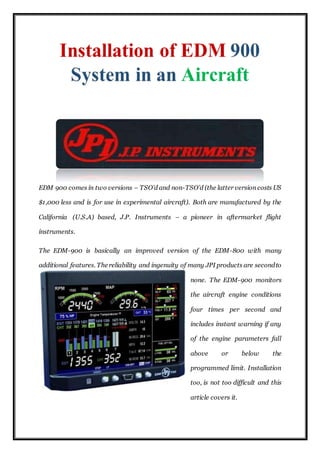Installation of edm 900 system in an aircraft
- 1. EDM 900 comes in two versions – TSO’d and non-TSO’d (the latter version costs US $1,000 less and is for use in experimental aircraft). Both are manufactured by the California (U.S.A) based, J.P. Instruments – a pioneer in aftermarket flight instruments. The EDM-900 is basically an improved version of the EDM-800 with many additional features. The reliability and ingenuity of many JPI products are secondto none. The EDM-900 monitors the aircraft engine conditions four times per second and includes instant warning if any of the engine parameters fall above or below the programmed limit. Installation too, is not too difficult and this article covers it.
- 2. Installation of the EDM 900 To begin with, you need to sort out the various pieces and harnesses that are in the EDM 900 box. The box also includes the EDM installation guide and the check-out test report. The EDM installation guide has got the entire installation process in it. So, in this article we shall cover things that are not specifically covered in the installation guide. 1. Screen orientation: The screen orientation can be changed from landscape i.e. horizontal to, portrait i.e. vertical display. This can be achieved by holding the step button for approximately 5 seconds. When you see the large arrow, push the lean fine button to position the display the way you want it and then tap step to save. The EDM will then reboot and change the display to the new orientation. 2. In our view, most of the post-installation problems relate topoor quality cable terminations and insufficient wire lengths. For example, when cutting the leads to the probes, ensure you leave enough slack in the wiring so the probe may be interchanged to an adjacent cylinder (for testing). 3. Make sure the temperature probe is wired to the correct polarity. 4. When crimping wires, verify the quality of each crimp with a sharp tug on the wire - when crimped correctly, the terminals should be impossible to pull off. 5. The star washer must be placed between the ring lugs - not against the nut slide the sleeve. 6. Always push wires from the cabin through the firewall to the engine side and try to use existing rubber grommets. When you've finished, use flame retardant silicone to fill up any gaps along the wire route.
- 3. 7. When fixing EGT’s, be warned that they will fail if they get chafed so always keep your wire routing clear of the hot spots. 8. The EGT Probe requires a 1/8 diameter hole 2 to 4 inches from the exhaust flange. The probe should be inserted into the drilled hole so the tip of the probe is in the centre of the exhaust stream. 9. The fuel flow sender must be installed using the supplied connectors and fire jacket. Every fuel flow sender is a little bit different so before you being the installation, write down the k-factor written on the side of your unit. 10.Finally, never use Teflon tape anywhere near fuel lines only use the supplied steel fittings. For more information on EDM 900, please visit: https://www.jpinstruments.com/shop/edm-900-2/ JPI Sales: 1-800-345-4574 714-557-3805 FAX: 714-557-9840 sales@jpinstruments.com JPI Technical Support: 1-800-345-4574 714-557-3805 support@jpinstruments.com



